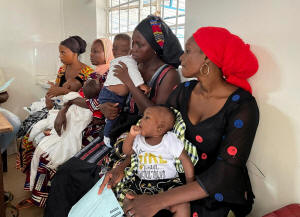Childhood vaccine rates show signs of recovery after pandemic backslide
- Gavi
 Send a link to a friend
Send a link to a friend
 [June 14, 2023]
LONDON (Reuters) - Childhood immunisation rates began to recover
last year in the world's poorest countries after being badly hit by
COVID-19 disruptions, according to the global vaccine alliance Gavi. [June 14, 2023]
LONDON (Reuters) - Childhood immunisation rates began to recover
last year in the world's poorest countries after being badly hit by
COVID-19 disruptions, according to the global vaccine alliance Gavi.
Last year, 80% of children got their diptheria, tetanus and pertussis
(whooping cough) vaccine, known as DTP3, according to early data from
Gavi. That compares to 78% in 2020 and 77% in 2021. Before the pandemic
hit, coverage rates had reached 82%.
Global health groups have called the pandemic's impact on routine
immunisation for children "the largest backslide in a generation".
While the new data only covers 57 countries supported by Gavi, which are
among the poorest in the world, the alliance said it showed the first
signs of recovery after two years of deterioration.
"Millions of children missed out on essential vaccines in the last three
years. Catching up these children is a priority this year," added Dr
Tedros Adhanom Ghebreyesus, Director-General of the World Health
Organization. The WHO and UNICEF will provide wider estimates of
coverage next month.

[to top of second column]
|

Mothers wait with their children while
Health workers prepare routine vaccines for young children at
Bundung Maternal and Child Health Hospital in Bundung, Gambia August
30, 2022. REUTERS/Edward McAllister/File Photo
 The DTP vaccine is used as a marker
for routine immunisation coverage more broadly, including shots that
protect against other killer diseases such as measles.
Gavi released the data on Tuesday as part of a strategic meeting in
Madrid assessing its recent progress, at which it also said it had
reached more than 1 billion children with vaccinations since its
establishment in 2000.
Gavi, which is backed by donor governments and philanthropists like
the Bill & Melinda Gates Foundation, works with poorer countries to
fund bulk-buy vaccination programmes.
(Reporting by Jennifer Rigby; Editing by Conor Humphries)
[© 2023 Thomson Reuters. All rights
reserved.]This material may not be published,
broadcast, rewritten or redistributed.
Thompson Reuters is solely responsible for this content. |